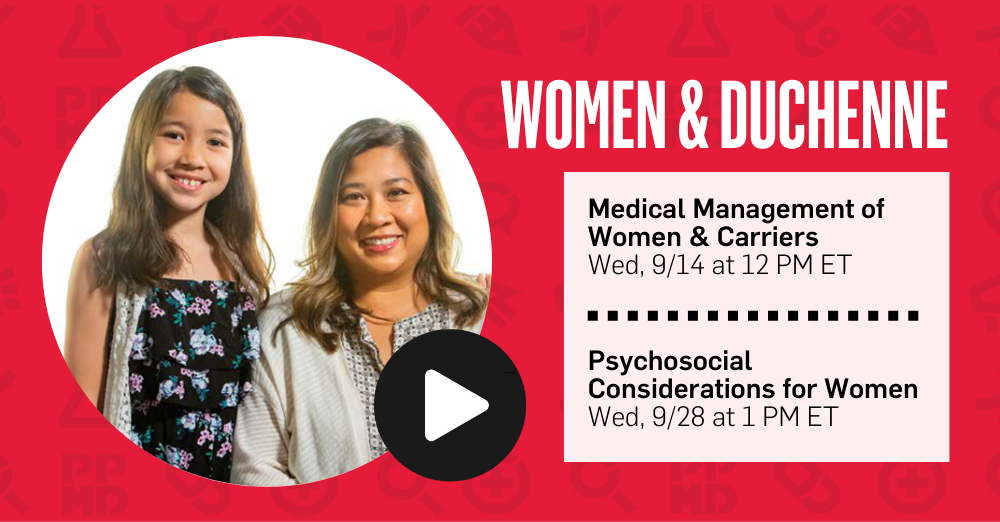
While we often think of the physical aspects of Duchenne and Becker muscular dystrophy, we don’t often talk about the emotional effect it has—especially for caregivers.
As part of World Duchenne Awareness Day’s emphasis on Women in Duchenne, PPMD recently hosted a webinar emphasizing the importance of psychosocial wellness for mothers, sisters, grandmothers, and anyone in the role of caregiver for someone with Duchenne or Becker muscular dystrophy.
Mena Scavina, DO, PPMD Certified Duchenne Care Center program Advisor and Pediatric Neurologist at Nemours Children’s Health, welcomed a group of panelists to a discussion on the emotional implications being a caregiver can have on someone. Our panel included:
- Jamie Jackson, PhD, a researcher and licensed clinical psychologist at Nationwide Children’s Hospital
- Kiley Winstead, LCSW, a Licensed Clinical Social Worker formerly at Kennedy Krieger Institute
- Gretchen Agans, an MSW candidate, Duchenne mom, and PPMD Connect Group coordinator
Watch: Psychosocial Considerations for Women in Duchenne
Key Takeaways from Dr. Jamie Jackson
Dr. Jamie Jackson started the conversation by bringing awareness to the many roles women in the Duchenne community hold in their life. This includes being a mother, caregiver, partner, sister, daughter, friend, patient, professional, as well as self. Each of these roles requires energy and attention and can be difficult to maintain all at the same time.
Dr. Jackson spoke about a study recently done at Nationwide Children’s that compared female caregivers of people with Duchenne or Becker muscular dystrophy to other women of similar age and socioeconomic status. The study found that caregivers reported higher levels of perceived stress as well as higher levels of anxiety and depressive symptoms. 40% of caregivers reported symptoms of anxiety compared to only 5% of the control group.
Dr. Jackson discussed that these findings are not surprising, but it shows there is a need for support for women and caregivers in the Duchenne community. One of the ways to help cope with the stress of being a caregiver is through building resilience. Dr. Jackson provided a resource from the American Psychology Association that can help provide families with the tools to move forward.
Key Takeaways from Kiley Winstead, LCSW
Kiley Winstead, LCSW shifted the discussion to explore ways that a chronic illness not only affects the individual, but the family unit as well. She touched on the fact that there are many stages of grief and loss with a diagnosis like Duchenne and the importance of coping and adjusting along the way.
Kiley talked about self-care and what that can mean for someone. Taking a long hot shower may be self-care for one person, while watching your favorite TV show after everyone has gone to bed may be for someone else. It’s important to remember that everyone’s needs are not the same, and it’s okay if they look different for each person.
Kiley also explained Acceptance Commitment Therapy (ACT) and the steps involved to help with coping. She also provided a resource to help families locate a local mental healthcare provider which can be found here.
Key Takeaways from Gretchen Agans
Gretchen Agans provided the group with her experience as a mom and caregiver. Gretchen shared her personal journey to the realization that her son had Duchenne muscular dystrophy and the emotional whirlpool and isolation that ensued after. She shared what ended up allowing her to find time for herself; including art journaling and listening to audiobooks while fulfilling everyday roles as a mom and provider.
Gretchen talked about how she found her people who lifted her up—some with similar experiences as her, while others with a totally different background. Gretchen is also one of PPMD’s Connect Coordinators for her state and has found this avenue to connect with others going through a similar journey.
If you would like to connect with a PPMD Connect Coordinator or see if there is a PPMD connect group in your area, please click here or email nicole@parentprojectmd.org.
Additional Resources
As each presenter shared, it’s important to know that every person handles stress differently and that’s okay. Being a caregiver for someone with Duchenne involves a lot of stress even in everyday activities. But there are ways to help cope and find resilience so that you can be a happier and healthier version of yourself.
If you need help finding resources in your area, please reach out to the PPMD’s Care Team by emailing careteam@parentprojectmd.org
If you or someone you know is experiencing extreme distress or in crisis, please visit 988lifeline.org or dial 988 to talk to a professional.



 by: Parent Project Muscular Dystrophy
by: Parent Project Muscular Dystrophy

